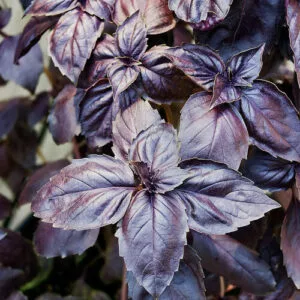Basil Black Seeds (20 seeds)
₹35.0
Basil is a traditional green color, but some are eye-catching purple. Purple basils are unusual and attractive growing in home gardens. They are insanely aromatic. Try our Non-GMO Black Basil Seeds. Also, check out our workshops for more details.
PRODUCT DESCRIPTION
Number of seeds in a packet – 20
PLANT DESCRIPTION
- Difficulty Level – Easy
- Plant Height – 18 – 24 inches tall
- Type – Indoor (Balcony / Terrace)
- Aroma – Similar to pepper, anise, and mint.
- Flavour – Clove flavour
- Feed – VermiCompost for nutrients every week, Seaweed once a month for greener leaves, and Epsom salt for better blooming once a month.
- Watering – Every 3 to 4 days
- Sunlight – Full sunlight
- Germination Time – 1 week
- Suitable Temperature – 25°C – 30°C
- Season – Annual
- Sowing – Summer
ALTERNATE NAME
Botanical name: Ocimum tenuiflorum
basil black seed in hindi: Kali Tulasi (काली तुलसी)
basil black seed in tamil: Karuppu Tulasi (கருப்பு துளசி)
basil black seed in telugu: Nalla tulasi (నల్ల తులసి) , black tulsi
basil black seed in kannada: Kappu Tulasi (ಕಪ್ಪು ತುಳಸಿ)
basil black seed in bengali: Kalo Tualsi (কালো তুলসী)
basil black seed in marathi: Kali Tulasa (काळी तुळस)
basil black seed in malayalam: Karutta Tulasi (കറുത്ത തുളസി)
Other names: bazil black seeds, Medicinal plants
You must be logged in to post a review.
Q & A
Organic herbal seeds can contribute to sustainability in several ways. Here are some key points regarding the sustainability of organic herbal seeds:
Environmental Impact: Organic farming methods focus on maintaining the health of the soil, water, and ecosystems. Organic herbal seed production avoids the use of synthetic fertilizers, pesticides, and genetically modified organisms (GMOs), reducing the environmental impact associated with conventional agriculture. This promotes biodiversity, conserves natural resources, and protects the long-term health of the ecosystem.
Soil Health: Organic farming practices, including the production of organic herbal seeds, emphasize building and maintaining healthy soil. Organic farmers use compost, cover crops, and crop rotation to improve soil fertility and structure, which helps prevent erosion, enhances water retention, and promotes nutrient cycling. Healthy soils support long-term agricultural productivity and contribute to overall sustainability.
Chemical-free Products: Organic herbal seeds are produced without the use of synthetic chemicals, such as pesticides and herbicides. This means that the seeds themselves are free from chemical residues that can be harmful to human health and the environment. By choosing organic seeds, farmers and gardeners can cultivate herbs without relying on synthetic inputs, thereby reducing their exposure to potentially harmful substances.
Seed Sovereignty: Organic herbal seeds often come from open-pollinated or heirloom varieties. These seeds can be saved, replanted, and shared by farmers and gardeners, allowing for greater seed sovereignty. This means that individuals have control over their seed supply, reducing dependence on commercial seed companies and promoting local resilience in agriculture.
Health Benefits: Organic herbs produced from organic seeds are generally considered to be healthier options for consumption. They are grown without the use of synthetic pesticides or herbicides, and therefore contain lower levels of chemical residues. Furthermore, organic farming practices often promote the production of more nutrient-dense plants, which can contribute to better human health and nutrition.
It's important to note that while organic herbal seeds contribute to sustainability, the overall sustainability of a farming system depends on various factors, including the entire production process, transportation, packaging, and waste management. Considering the entire lifecycle of the product is crucial to fully assess its sustainability.
General Inquiries
There are no inquiries yet.



















Reviews
There are no reviews yet.